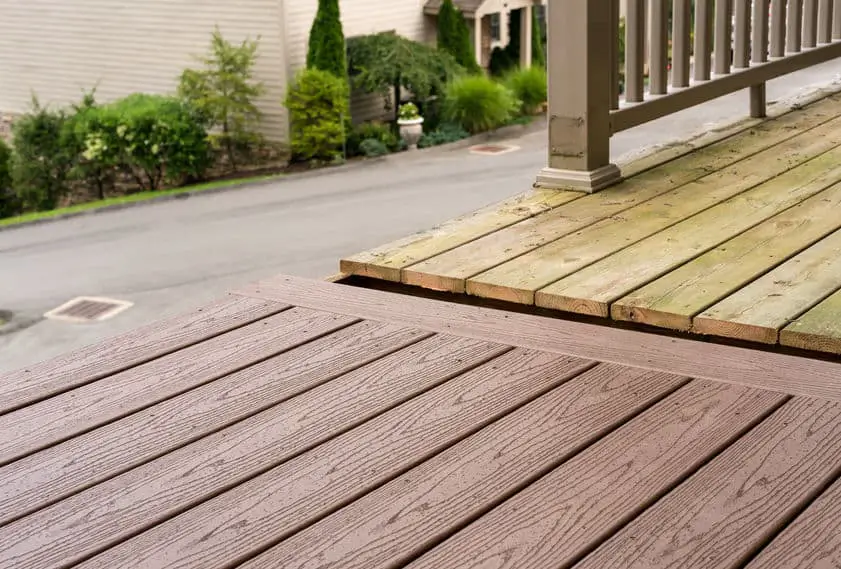This post contains affiliate links.
Are you thinking of getting a new decking done at your home but you’re split between getting a composite decking and wood? Maybe you’re already inclined to choose composite decking instead of wood but you still would like to know how strong it is compared to wood. If you would like to know, then read on.
Is composite decking stronger than wood? If its structural stiffness, then the short answer is no. Wood is still structurally stronger than any composite decking. But being strong can also mean to be durable and one that can last longer. If considering other factors as well, most composite decking is considered more durable than wood.
Composite decking is flimsy on its own. This is why wood is still being used for the structural members or framing of the deck while the composite decking is only used as its floor layer. While composite decking is flimsy on its own, integrated with the whole assembly of the deck, it could last longer than any wood deck flooring with the proper care and maintenance.
There was a time that the quality of composite decking was really bad and durability wise, it didn’t last as long as wood. Most of its flaws have eventually been corrected over time and a lot of brands have developed better products that are considered a better alternative than wood.
If durability is a factor you consider important for your decking, then consider using composite decking instead of wood. Below are some of the reasons why you should.
Composite Decking Can Withstand Moisture Better than Wood
As we all know, water is the main culprit in wood damage and decay. Though there are several ways to treat and add moisture protection to wood decking, there is still the possibility of it failing if the deck is not regularly maintained. Improper application of moisture protection can also lead to wood decay overtime.
Proper care and regular maintenance are essential to prolong the life of wood decking and protect it against water damage. If the wood gets wet starts absorbing water, it can lead to warping, splintering, cracking, or decay over time.
This is not the case if you are using composite decking. Most composite decking, if not all, are fully-moisture resistant. Composite decking does not need any treatment or application of any moisture-resistant coating. Choose a fully capped composited decking though as this ensures full protection against moisture.
Composite decking is superior at moisture-protection compared to wood. Rotting, warping, splintering, or cracking due to water damage will not be something to worry about.
Composite Decking Requires Less Maintenance Compared to Wood
Maintenance can be a big factor for any decking’s durability. Whether its wood or composite decking, proper care and maintenance can prolong the life of your deck. Improper or missed scheduled maintenance could affect the quality of your decking over time.
Wood decking maintenance can be demanding at times. Besides the regular cleaning with soap and water, it would require an annual refinishing, sanding, sealing, and staining which will extend the wood’s protection against the elements. Disregarding or missing to do this may lead to damaging your wood decking and could shorten its life span.
Composite decking, on the other hand, does not need refinishing and only needs regular soap and water cleaning. This makes composite decking low-maintenance and takes a great deal of weight off your shoulders. You wouldn’t have to worry about the potential damage caused by missing any scheduled refinishing or resealing of your decking.
Composite Decking Can Resist Wear and Tear Better than Wood
Staining, scratches, gouges, splitting, and fading are some of the natural wear and tear any decking material would have to endure over its lifetime.
Wood decking is susceptible to accumulating scratches and gouges over time. How the decking is being used and treated by its users really matters. If you let your pets with long nails run around or move heavy furniture or objects across its surface can most likely lead to a lot of scratches on the wood deck’s surface. Although there are coatings you can apply over the wood, most of the time, these are not enough to protect against heavy scratches.
You can go for hardwood for your decking that can withstand heavy use such as ipe, if you still want to use a wood decking, but you’ll be spending more.
Most of the top brands of composite decking have a hard plastic shell bonded with the material and is applied around the surface that protects it against heavy scratches. It can be comparable to heavy wood, if not better, at withstanding scratches and gouges. Most scratches in composite deckings can actually be removed using a heat gun.
Wood decking can split due to extreme changes in temperature. The constant expansion and contraction of wood due to changing temperatures and humidity can lead to splitting. Constant foot traffic, chair movement, heavy equipment such as grills, can also contribute to it’s eventual splitting.
The composition of composite decking prevents it from cracking and splitting, even with the harshest of weather or heavy activity and usage. Some companies even guarantee this with a 25 years warranty against splintering or splitting.
There was a time when extreme weather changes and exposure to moisture could lead to extreme warping of composite decking but they have improved a lot. Composite decking nowadays are durable and is protected against warping.
Wood, on the other hand, is still susceptible to warping but this really depends on how wood is being maintained and handled, and preventing it from getting too much exposure to moisture. It still relies on good installation and giving the proper care after it has already been installed. It’s just a lot more to think about compared to composite decking.
On average, most composite decking could resist the natural wear and tear for up to 50 years as compared to wood decking which can last 10-30 years. For any material, all this of course really depends on how you care for your decking. It can last longer if you take the proper measures. But comparing both materials under the same conditions, composite decking could outlast the life span of a wood decking.
Composite Decking is not prone to Insect Damage
One of the biggest threat of any wood products is insect damage. There are wood-damaging insects, such as termites, that could penetrate the surface of the wood and bore holes, eventually damaging it. This can happen to a wood decking which could lead it to splinter or to break overtime.
This will not happen to a composite deck as it is not susceptible to insect damage. Composite decking is made of the combination of wood and plastic, and although it still has a wood composition, the decking does not attract insects and is well protected against their potential damage.
Disadvantages of Composite Decking to be Aware Of
Just like any other material, there are still disadvantages of using composite decking compared to wood. Although looking at the whole picture, composite decking has a clear advantage, it is still best to be aware of some of its disadvantages.
For one, composite decking can fade over time. Parts that are constantly exposed to sunlight will eventually fade in color. This problem has been mitigated over the years with advances in research, and the addition of better UV resistance and protection. Unlike before when extreme fading can happen, it will take several years before there is any noticeable change in color.
Composite decking can also become hot when exposed to the sun for a long time, as compared to wood. Walking barefoot would be painful. There are some composite decking companies though have already developed products that are 30% cooler than before. A 30% difference makes a huge difference, and walking around a pool barefoot would be more comfortable.
Looking at the all the angles, composite decking would be a durable material than wood. If you’re not keen on regular decking maintenance, go for composite decking. Again with both materials, proper care and maintenance is really the key to making any decking last longer.
Personally, nothing beats the look and feel of natural wood, and if you have the time and energy to maintain it regularly then go for this material. If maintenance will be an issue though, I would recommend getting a composite decking instead.
All About Materials is a participant in the Amazon Services LLC Associates Program, an affiliate advertising program designed to provide a means for sites to earn advertising fees by advertising and linking to Amazon.com. We also participate in other affiliate programs which compensate us for referring traffic.

